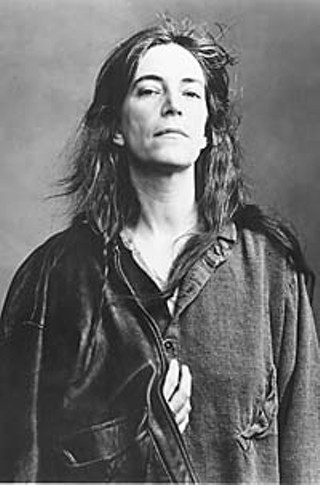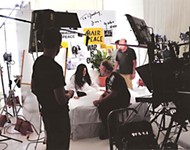SXSW Profiles
Friday Night
By Jody Denberg, Fri., March 17, 2000

Patti Smith, Outdoor Stage, Waterloo Park, 7:30pm
For several years, 107.1 KGSR Program Director Jody Denberg has shared with the Chronicle his conversations with performers like Lyle Lovett and Tom Waits, produced for promotional interview discs. For the latest, he talked to Patti Smith, high priestess of poetry-and-punk, about her latest album Gung Ho and other matters dear to her heart.
Austin Chronicle: The last major work that you did was in 1998, a compilation book called Complete. And now you have a new album called Gung Ho, so now Complete isn't complete anymore.
Patti Smith: [Laughs] Yeah, it's incomplete. I'll have to do one called Completed. We did update the paperback with as much of Gung Ho as I had ready at the time. And on the new album we will include all of the lyrics for those who want them. So I did the best I could to get them in under the wire for the paperback.
AC: One of the new songs on Gung Ho is called "Glitter in Their Eyes." I read it as kind of a rage against this rampant consumerism that's going on right now.
PS: "Glitter In Their Eyes," I co-wrote with Oliver Ray. It says, "Look out kids, the gleam, the gleam." It's sending out both a warning and a caring salute to young people who are constantly being exploited by business. They're targets. Children aren't children anymore, they're a demographic. And they're a consumer demographic.
AC: Along with the outward-looking songs on Gung Ho, there are also songs that look within. Is "Lo and Beholden" your own current romantic situation set behind some poetic veil?
PS: Well, it's not, not really. This is a real classic Patti Smith/Lenny Kaye song, because the music is so much like Lenny. It's taken from the point of view of Salome, who has been exploited by both her father-in-law, King Herod, and her mother, Herod because he's after a piece of her youth and beauty [and] her mother because she wants the head of John the Baptist. So this beautiful girl has forever been tainted.
AC: For the last 25 years, for the most part, you've played with the same core group of musicians. Is it simply a matter of loyalty for you or is the idea of being in a long-term rock & roll band part of what gets you off?
PS: I never came into recording as musician or anyone with any training or even any desire to do records. I came into recording as a performer who was concerned about the state of rock & roll. My concept of performing was that people had a real group, like the Rolling Stones. And I thought, when you have your group, that's your group.
In the Patti Smith Group, we had our core group. That was a rock & roll band. There was no pretense of us doing anything else. I was completely untrained and just going on instinct and also sort of an idealistic idea of what a rock & roll band was, which includes the loyalty, the camaraderie and, you know, the struggle. That meant more to me than trying to make things technically perfect or having the optimum guitar player. I liked the people I worked with. We all believed in the same things.
AC: Except for a couple of songs, most of the songs on Gung Ho are co-written with one other band member. I was curious how you decided which of your band members you were going to bring a lyric to to collaborate on?
PS: I rarely write lyrics first. I improvise in the practice room. On "Lo and Beholden," Lenny brought the music, the band played it, and I just improvised. The song, whatever, how the song felt, is what I gleaned from it. "Gung Ho" was written because I was studying Ho Chi Minh. I had read several books about him, read all of his works. I walked in the practice room and they were riffing -- the band had this riff and I listened to it and I loved it. And it just drew me to the microphone. And I started improvising what became "Gung Ho." That's pretty much how I work.
AC: Parts of Gung Ho are a more fleshed-out and full than Peace and Noise and Gone Again. Was that a result of working with Gil Norton, who had worked with Counting Crows and the Pixies? How did you choose him to work with?
PS: First of all, Gil Norton and his engineer, Danton Supple, are great. They allowed for us to be who we were, but give us, you know, their expertise and ideas about sound. But they never were invasive.
This record sounds better and seems even more fully realized now that we, as a band, have spent four years together. Gone Again was made just as best we could because Fred passed away. I was greatly dispirited, I didn't really have a band and it was hard for me to even want to record, so that was really an act of a lot of people coming together, keeping my spirits up. Lenny. Tom Verlaine came in on it. All of the same band members. And Peace and Noise, I was still getting my feet back on the ground. Now, we've been through all kinds of things together, and this album reflects the trust and strength that we've built, with a lot of struggle and much credit to our producer and engineer.
AC: Before your husband, Fred "Sonic" Smith, died in '94, he was giving you guitar lessons though you've played since the early days. ...
PS: In the Seventies I got very involved in the sonic aspects of the electric guitar. I wasn't interested in chords. I didn't bother learning chords in the Seventies. I was totally interested in feedback, sound, and Fred helped me with that. He helped me wire a Fender Twin in a special way, 'cause he was the king of feedback.
He promised me he would show me chords if I practiced hard. And I had an old Thirties Gibson, an acoustic guitar, which I still have. He showed me every chord, except we ended and I never got a B chord. But I know all the other chords.
That was the last thing that Fred taught me -- rhythm, getting a good rhythm, and my chords. And I always think about that, it was like the last gift he gave me. And I've used it well.
AC: The last album's title Peace and Noise was conceived by your daughter Jessie -- I read that she plays some piano. And on "Persuasion," your son Jackson plays guitar. How old are Jessie and Jackson now, and is it by watching you that they became inspired to make their own art?
PS: Jessie is a 12-year-old girl and she's exploring many things. She writes, and she's curious about the whole world.
Jackson is 17, and he really picked up guitar after his father passed away when he was about 12 years old. Jackson actually has a lot of his father's gifts. He didn't know that he had them. He didn't show any real interest in music until after his father passed away. He really wanted to be an ice cream man for a long time. He spends a lot of time studying different guitar players and different styles of music, everything from Renaissance music to Danny Gatton. But he's very involved in the playing of the music and learning. He's not interested in the music business or anything like that.
AC: "Persuasion" features your son, Jackson, on the guitar solo, but it's credited Smith/Smith. Did Jackson co-write that, or is that a song you wrote with Fred a while back?
PS: Fred and I wrote that song for Dream of Life originally. We had too many songs for Dream of Life, so we never actually recorded it. This was the last recording that I was going to do in the 20th century and I wanted Fred represented one more time. Oliver one day said, "You know, it's Fred's song, we should have Jackson play the solo on it." He did a great job.
AC: What motivates you to write? Is it the process? Is it the end result? The immortality of the work?
PS: It's always different. I mean, I've always written, as long as I can remember. I fell in love with books; it was like love at first sight. I've loved books since I was a small child. As soon as I learned that one could write a book, I became interested in writing. I read Little Women and there was -- Jo was the writer, and it occurred to me, yes, I can do that.
AC: Between 1979 and 1996, you only released one album, Dream of Life in '88. One of the reasons was that you were raising your young family at the time. But it's also part of the artistic process to like absorb and then give, right?
PS: It's always humorous to me when people say to me, "Well, you didn't work in the Eighties, right?" I worked harder in the Eighties than I ever did in my life. Not only tending to children and washing diapers and all of the different tasks one performs in raising a family. I spent hours and hours developing my craft as a writer, studying so that I would have new points of view, new things to say, a better understanding of humankind. I mean, I even studied sports.
I learned for the sake of comprehending what our society likes and what they do and who they are. I studied various aspects of art history, religions, the Bible. As you said, I spent the Eighties replenishing myself as an artist and evolving as a human being because there is nothing that will stunt one's growth more than staying too long as a rock & roll star.
AC: How do you account for your prolific output? Gung Ho is your third album in four years.
PS: One thing is my children have gotten to a point where they're old enough they don't need as much tending to, so I have a lot more time. I've always been a prolific person, but basically privately prolific. I do a lot of work that no one sees. But I think the real reason is because I've had a lot of input and energy from other people.
AC: Well, now that Jackson and Jessie are a little older, do you think you might tour more than you have over the last few years?
PS: Probably. The way that we perform, every night is different. We really collaborate with the people and the energy of the night. I improvise a lot and it's physically taxing work. But certainly, we'll tour probably more than the last two albums. Not like Metallica [laughs]. I can't do that, nor do I have the desire to do that.








